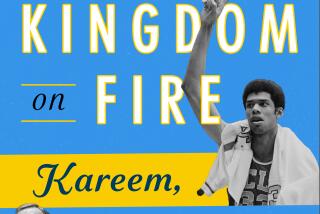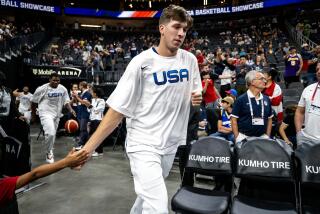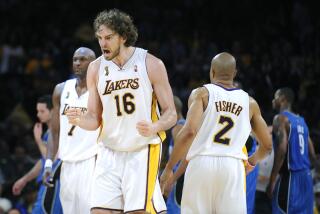Curtain Call : As an NBA Rookie at 31, Sabonis Shows Some of That Old Soviet Brilliance, but, Oh, What Might Have Been
- Share via
A nation idolized him. A beauty queen married him. An empire drafted him. Two American secretaries of state petitioned a Soviet premier on behalf of this . . . basketball player.
But in the land of the free and home of the brave, not to mention rich basketball players, Arvydas Sabonis was a rumor, shrouded in mystery, wrapped in an enigma like the Soviet Union he once represented.
By the time he arrived in Portland last fall at age 31, most of his career was behind him, not to mention his mobility. He is still so impressive that Coach P.J. Carlesimo keeps getting the same question:
What might he have done if he’d arrived in his 20s before tearing both Achilles’ tendons?
“People ask that a lot,” Carlesimo says. “I never think about it. What he’s accomplished already, not just here but throughout his career--it’s scary.
“He’s a great, great big man, but without the injury? Had he played here for a long time and not had injuries, there’s absolutely no limit to how good he could have been.”
Put it this way: If Sabonis had arrived in the ‘80s when Clyde Drexler still glided and Blazermania still flowered, they might have won another title or two and the Lakers, Detroit Pistons and/or Chicago Bulls might have won one fewer.
Picture a player with quickness, anticipation, leaping ability, soft hands and one of those genius basketball IQs one sees only a few times a decade: Magic Johnson, Larry Bird, Michael Jordan, Chris Mullin, John Stockton.
Picture all that on a player as massive as Mark Eaton, 7 feet 3 and 292 pounds. That was Sabonis in his prime.
“A quicker Bill Walton,” says Phoenix Sun assistant Donnie Nelson, who coaches Sabonis on the Lithuanian national team.
“You didn’t have to be a rocket scientist to know he’d play well. The guy’s 7-3, he has that bulk and his passing ability. He was the second-best three-point shooter on our Lithuanian team to Rinas Kurtinaitis, who’s world class.
“The guys on the Dream Team told me they couldn’t believe how big the guy is. You see tall guys, but you don’t see guys who are that tall and that bulky or proportioned.
“When you’ve got guys who understand the game like Chris Mullin and Stockton and they see a guy who’s got that kind of vision, who understands the game--guys like that like to play against each other.
“Coaching him was a cakewalk. The game is so easy for him. He’s so smart.”
Getting him to Portland was the hard part. The Trail Blazers drafted him in 1986, when perestroika was new. Sabonis’ fate was controlled by Soviet bureaucrats who wouldn’t let their players play abroad, even in Europe, for another two years.
Sabonis was then, in the words of Soviet Coach Alexandr Gomelsky, “great artist,” a natural who had grown up in Lithuania, as much a lightning strike as Fernando Valenzuela appearing out of the Sonoran desert. Sabonis started on the top Lithuanian club team at 16, made the Soviet national team a year later and toured the U.S. as an 18-year-old prodigy in 1983 when Billy Packer called him the Soviet version of Walton.
Little Lithuania, which was suddenly producing many of the top Soviet players--Sabonis, Kurtinaitis, Sarunas Marciulionis, Valdemaras Khomichius--became a hotbed, and there was no doubt who its first star was.
“Rooney [Marciulionis] was the first Lithuanian in the NBA, and they admire his incredible work ethic,” Nelson says. “But with Sabonis--there’s a certain aura about Sabonis.”
Sabonis married a former Miss Lithuania. Their wedding was practically a national holiday and was commemorated in a picture magazine, like Princess Di’s.
By the mid-’80s, Sabonis was a bored artist without peers or, often, interest. He lounged around the floor, throwing behind-the-back outlet passes. The rabid European sports press said he was a problem drinker, but teammates denied it. Forward Alexander Volkov once told a friend that Soviet players all liked to drink, Sabonis no more or less than the rest of them.
The curtain to the West lifted in 1988, but Sabonis had torn his left Achilles’. In the hospital, he fell down a flight of stairs on crutches and tore the right.
He was out 18 months. The Trail Blazers even got him to Portland for rehabilitation through the connections of then-owner Larry Weinberg, a Democratic Party heavy. A succession of politicians raised the issue with Mikhail Gorbachev himself.
The rehab went slowly. Sabonis went home, then surprised everyone including Gomelsky by announcing on the eve of the 1988 Olympics that he would return.
When Sabonis sauntered onto the court for his first practice, Gomelsky fired a ball at him from point-blank range to test his reflexes.
Sabonis caught it, flipped in a hook shot and kept walking, or so the story goes.
“I was in sandals,” Sabonis says through an interpreter. “He [Gomelsky] said come to the practice, we’ll see how you do. This was my second chance to be at the Olympics. The first was in 1984, the [Soviet] boycott. So naturally I desperately wanted to play, no matter what the situation. I would have gone there as a tourist.
“Of course, he surprised me with the pass. I caught it and immediately took a hook shot and hit it.”
More surprises followed.
The Soviets toppled the last amateur Olympic basketball team that would represent the U.S. Then with the way to the NBA open, Sabonis signed with a Spanish team. Intimates say he was leery of playing the NBA’s busier schedule on ankles that still hurt and had turned him into a gifted statue.
Sabonis doesn’t like to talk about it.
Although polite, he is withdrawn, even among Lithuanian friends and teammates. He speaks four languages--not including English--but is totally uninterested in the star turns of the Western press. Robert Edelman, a Russian history teacher at UC San Diego who has known him for 10 years and translated at some of the negotiations that brought him here, says Sabonis “speaks four languages and is monosyllabic in all of them.”
But by 1995, with Europeans establishing themselves in the NBA and Sabonis’ Real Madrid team in financial trouble, he began thinking of the NBA again. His mobility had never come back, but his ankles weren’t getting worse. He was 30, and as he told Edelman, “I didn’t want to have any regrets.”
The transition wasn’t easy. Carlesimo brought him off the bench behind Chris Dudley. This gave the Trail Blazers a formidable two-headed center--at the All-Star break, they were averaging a combined 18 points, 17 rebounds and 2.3 blocks--but the team went nowhere.
“Sabonis is a little bit down at times,” Volkov told SportsExpress, a Russian newspaper, at midseason. “It’s a feeling I myself know.
“In my first year in Atlanta, I experienced it. Portland for Sabonis is a different kind of city. It’s wet and it’s cold and the people are different after the warmth and joy of Spain. To come from Madrid to little Portland is as if I went from Moscow to the provinces.
“There has been a problem with the language. He is really alone on the team. There aren’t people with shared interests. In Madrid he had Sasha Biriukov and Rinas Kurtinaitis.”
Language problems remain, but the others are working out.Carlesimo began starting Sabonis shortly after the All-Star break and the Trail Blazers surged. In their last 20 games, they have gone 17-3 with Sabonis averaging 18 points and 11 rebounds in 26 minutes while shooting 56% from the floor.
“He has my vote for rookie of the year,” Clipper Coach Bill Fitch says. “If you had the draft again tomorrow, who would you take ahead of him? You only may have these guys for three years anyway, so what difference does his age make?”
It isn’t the warmth and joy of Spain or the ease and comfort of his native land, but it’s a living. He has a five-year, $12-million contract and a $1-million home in the suburbs, where he and his wife, Ingrida, live with their two sons.
He says he never thinks of what might have been if he had arrived earlier. When someone asks, he actually winces.
“If an old lady had a beard,” he says, “she’d be a man.”
This is a very rough translation. Sabonis’ teammates, listening in, laugh uproariously, led by Cliff Robinson. Some things are universal. Arvydas Sabonis is settling into little, cold, wet, Portland.
More to Read
All things Lakers, all the time.
Get all the Lakers news you need in Dan Woike's weekly newsletter.
You may occasionally receive promotional content from the Los Angeles Times.








